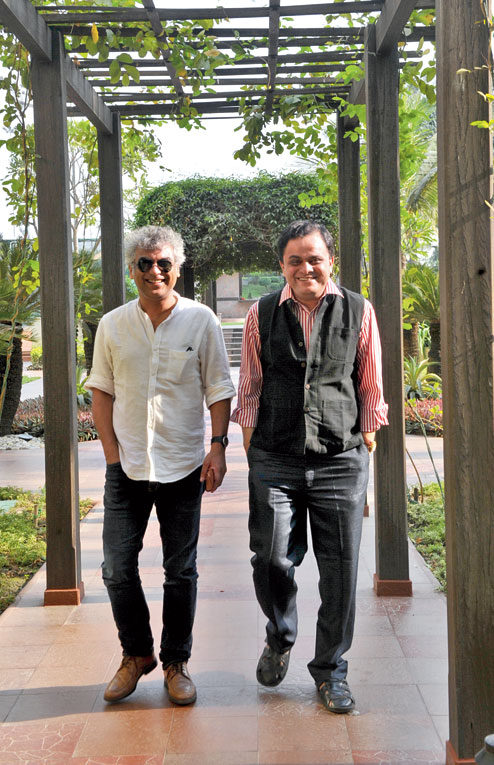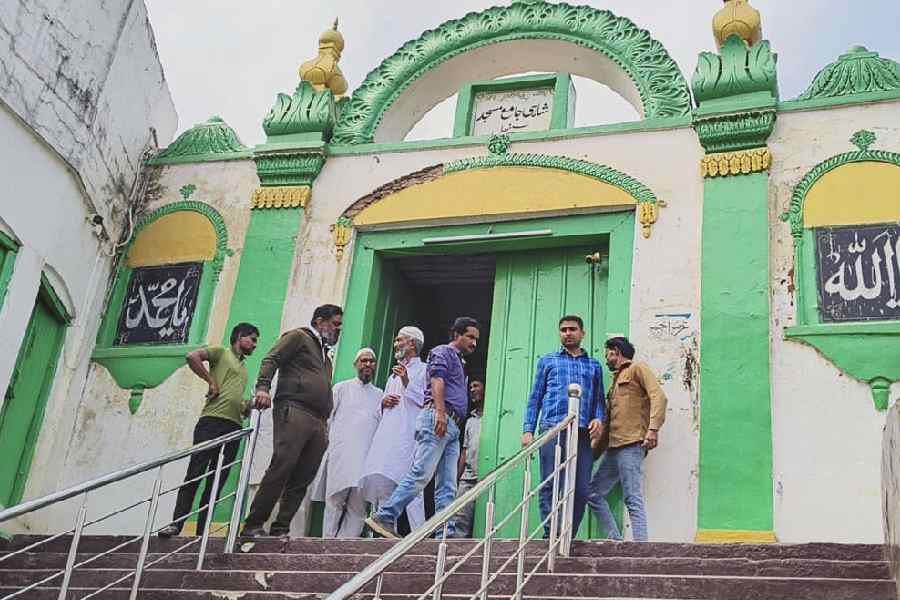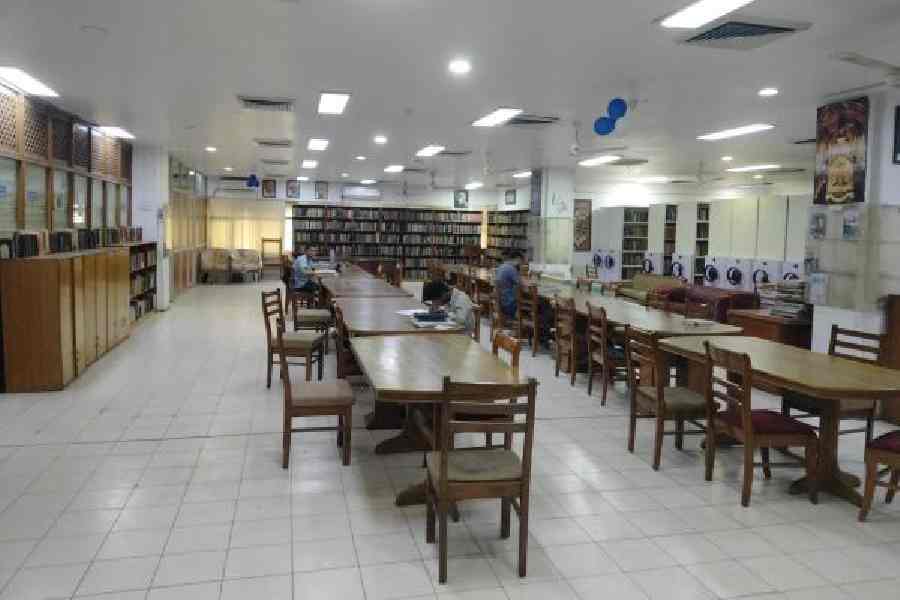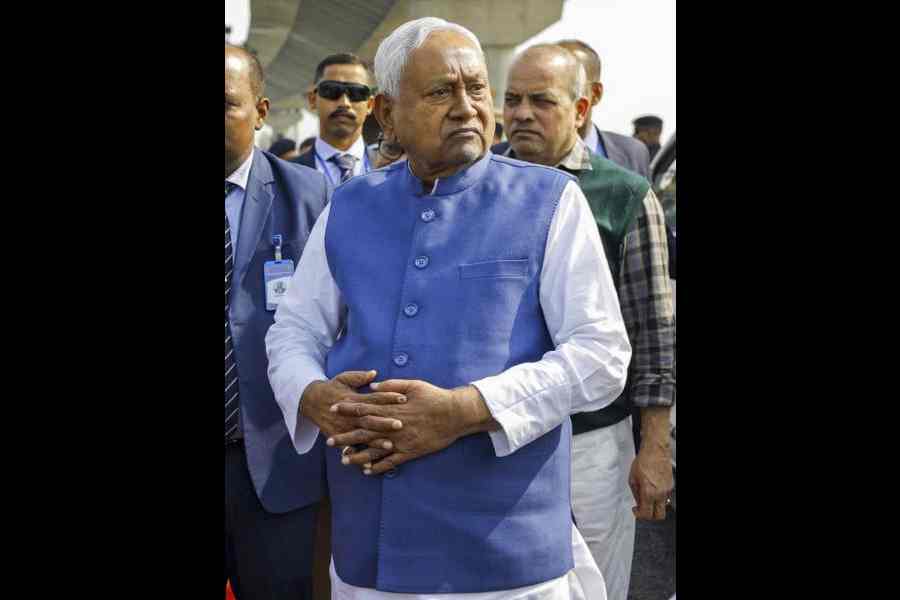
They have been friends for the longest time, but sometimes they have found themselves on opposite sides of the ideological divide. That, however, doesn’t affect their regard for each other as artistes, an example of which is the Friday film Asamapto. Today, what would Suman Mukhopadhyay want to ask his actor Bratya Basu? And what would the minister of state for IT and electronics want to know from his director? t2 found out at an adda at Hyatt Regency’s The Waterside Cafe.
Bratya (to Suman): Asamapto is based on the novel by Shirshendu Mukherjee. I want to know how much you have deviated from it.
Suman: I have deviated a lot and I did it for the sake of the film. The novel is set on a huge canvas. It has lots of flashbacks. I have squeezed all of that into a story of six-seven days and completely done away with the style of the novel. That is the biggest departure. I have also introduced a few characters and incidents. There’s a moral standpoint in this novel, which I have made a little ambiguous in the film.
Suman (to Bratya): We did Herbert in 2006. And in 2016, we worked together as actor-director again in Asamapto. A lot has changed in these 10 years, both of us have changed. While working on this film, did you feel our dynamics have changed over the years? Tor ki mone holo?
Bratya: Tor aar aamar bondhutwo toh Herbert-er somoy theke shuru hoyni. We were in college when we first met, we were about 18-19. Madhab Malanchi Koinya natokta kore tor naam-daak holo... I hadn’t started doing theatre then, I used to watch theatre. You and I have a personal equation outside of films, which has a lot of mixed emotions, but I think our love for art and our dedication to our work has remained the same. A lot has happened in the last 10 years, and whatever resonances it has left in us, positive or negative, I think we have been able to overcome that. We have an understanding of each other that I think is very important for art. It was there during Herbert, it was there during Asamapto too.
t2: Sumanda, what did you think of Bratyada the actor in Herbert and the one in Asamapto?
Suman: By 2006, we were established names in theatre. And over the next several years, both of us have grown, matured. What I noticed in Bratya this time was that he has retained the kind of innocence that is very essential in an artiste. One has to nurture that innocence.
Bratya: An artiste has to guard that innocence like a guerrilla fighter…
Suman: And when I am directing him, giving him instructions, the actor-director ego clashes never came into play. The way we operated back then hasn’t changed.
Bratya: Yes, we have always had respect for each other’s work.
Bratya (to Suman): I want to know how you would rate Ritwick, Swastika, Paoli and me in Asamapto? (Laughs)
Suman: (Laughs) I feel all of you have given your best in my film.... Bratya had a very difficult role in Asamapto. It would have been very easy to go overboard.
Bratya: Moloy is a very rugged character… his intelligence, oppression, repression, failure of conjugal life… he’s talking to his wife in abusive language and then quoting Marquez and Shakespeare. I tried to get into Moloy’s mind. Suman wove all of it into the script.
Suman: For a film actor, to keep the graph of the character in mind is very important. One has to look for the clues for a nuanced performance. This could have gone over the top anytime, it has been beautifully controlled.... A good actor is successful in both theatre and films. A good actor has control over himself, his muscles and can emotionally negotiate any moment. Theatre needs projection, which the lens does in cinema.
Bratya: And on stage, the actor has to do that job himself. He has to create a long shot, a mid-shot, a close-up with his body.
Suman (to Bratya): I want to know this as you are a director too… when I am directing you, do you feel you could do it differently?
Bratya: Na, na, absolutely not. I have a totally blank mind when I am working... specially with you. If I can catch what you are visualising, it will add to my performance.... That is why I also wanted to do theatre under your direction. I feel in theatre the actor-director bond becomes very strong. In films, it’s a lot formal.
Suman: Correct…
Bratya: Aar amar aar tor samparka akebarei formal noy…
Suman (to Bratya): Both of us have achieved a kind of cultural leadership. People do look out for the kind of work we are doing. Do you think in the present cultural climate we need to have a radical change or we can make do with some small changes?
Bratya: I think this entire structure needs to go. In the past 10-11 years, what has prevailed the most is the anarchy of the intellectual.
Suman: Do you really think that has happened?
Bratya: I mean the buddhijibi in our society has lost credibility, people look at intellectuals suspiciously. If we can restore it...
Suman: The people who were intellectuals are socially isolated. Nobody trusts the intellectual anymore. Intellectuals have become a farce.
Bratya: Yes, and we can say we are the minority. There’s been a degradation, in all the spheres of our lives, and we have done it ourselves.
Suman: We have to take care of this.
Bratya: Absolutely. Through what we are doing.
Suman: As an artiste, I have a responsibility to engage people in a cultural dialogue through my work. And I believe the work I am doing is the most important aspect of my being an intellectual. I feel this cultural movement to gain back people’s respect should start immediately.
Bratya: We have to be more responsible about our work, about our words, about our attitude.
t2: How would you explain Asamapto from that standpoint?
Suman: At this point in my life, I am looking at the conjoining point between my artistic life and my personal life. I am looking at myself as an individual and asking what have I gained, where have I failed. You always look back at the mistakes. It is a question to myself and also to society. Terms like marital bond, commitment, love…
Bratya: Conjugal morality…
Suman: Yes, what do these terms mean? What is truthfulness in relationships? The love and respect that still survives after 30-40 years of marriage, where does it come from? These questions played on my mind when I was doing Shesher Kobita. Also, I was deeply impacted by some Turkish and Iranian films. Those triggered the desire to make Asamapto in a way.... I thought, why can’t I do a film that talks about the deeper nuances of relationships? I started getting into the relationship space only from Shesher Kobita.
Bratya (to Suman): You don’t think of doing Bangla theatre anymore?
Suman: Yes of course Bangla theatre definitely korte hobe but I feel the language is becoming completely immaterial, be it in films or theatre. Doing another play is not a big deal. But that is not my creative satisfaction. I want to do something absolutely new and fresh. Last year, I did a theatre project for CIMA Awards, I would love to do that kind of work. I have come to a point in my theatre career where I want to do something that will take forward my work and also give something back to society.
t2: Bratyada, what motivates you to do theatre now? Is there a need to give out a message?
Bratya: There have been two gharanas in Bangla theatre, largely speaking — one is art for art’s sake, the other is art for society’s sake. This had given rise to issues of establishment/anti-establishment, purpose of theatre and several such arguments that have dogged Bangla theatre for the past 50-60 years. Now I find that I have become a part of the theatre that has been opposed….
Suman: …That’s a nice perception.
Bratya: So for me, the challenge is, how do I preserve my artistic self and how long will I be able to do that? How do I deconstruct myself while constructing a new theatre? This is tiring, self-defeating, destructive, but at the same time it’s also something that I enjoy.
Suman: You have set up several centres of your theatre group Bratyajon. Do you feel good about this company theatre?
Bratya: I feel the days of group theatre are over. In Bengal, we have had professional theatre where the producer was the main person, who didn’t bother about creativity. And there was group theatre, where the director was the head, who didn’t care for money. These are binary opposites, and I have become a combination of these two. I am having to strike a balance between both. Group theatre was like a joint family earlier, but now it’s one person shouldering it. The moment I realised this, I knew that group theatre was over. Now the fight we are giving is from company theatre, which I think will last another 10-15 years.
Suman: I would say that we are witnessing the death of idealism, of intellectualism. Group theatre came out of a situation where people were driven by an ideal. We are all influenced by ideas of socialism. That has faded and it has come to a situation where people have no particular agenda to do theatre or cinema. That ideal is gone. It’s the same in films.
Bratya: I feel Bangla cinema is still burdened with dead intellectualism.... Bengali theatre is working with different issues, if we can overcome that in our cinema too, if we can make films like Court (Marathi)....
Suman: I really want to think how I will make my next film. It has to be different, not in terms of the end product, but in the process…
Bratya: Yes, I completely agree. Suman: Now is the prime time for filmmakers to choose their subjects, to make the kind of films they want to make.
Reshmi Sengupta











